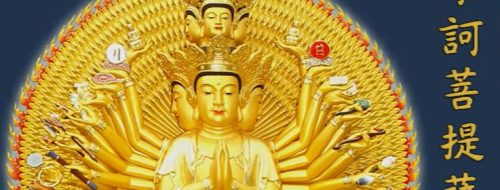虛空可量風可繫
허공가량풍가계
heo-gong ga yang pung ga gye
sky able measure wind able bind
無能盡說佛功德
무능진설불공덕
mu-neung jin-seol bul gong-deok
powerless explain buddha’s virtue-merit
Category: zen
Mantra of the Correct Origins of Gwanseeum (正本 觀自在菩薩 如意輪呪)
Mantra of the Correct Origins of Gwanseeum 正本 觀自在菩薩 如意輪呪 Namu motdaya namu dalmaya namu seunggaya namu ariya barogije saraya mojisadaya maha sadaya sagara mahagaro nigaya haridaya mandara danyata gagana barojijinda mani mahamudarye ruroruro jitta haridaye bisaye om budana budani yadeung 정본 관자재보살 여의륜주 나무 못다야 나무 달마야 나무 승가야 나무 아리야 바로기제 사다야 모지사다야 […]
Sublime Dhāraṇī of Gwanseeum Issuing from the Most Profound Heart of the Buddha 佛頂心 觀世音菩薩 陀羅尼
Sublime Dhāraṇī of Gwanseeum Issuing from the Most Profound Heart of the Buddha 佛頂心 觀世音菩薩 陀羅尼 Namora danadara yaya namak ariya barogidye sabaraya moji sadabaya mahasadabaya mahagaronigaya danyata abada abada baribadye inhyehye danyata salbadarani mandaraya inhyehye barimasuda motdaya om salbajaksugaya darani injiriya danyata barogije saebaraya salbadotta ohayami sabaha 나모라 다나 다라 야야 나막 아리야 바로기제 […]
A koan is always about something
When the Ancients let down a hook, it was never an empty manoeuvre; they invariably had some truth to benefit people. Commentary on “Ts’ui Yen’s Eyebrows”, Hekiganroku https://terebess.hu/zen/Blue-Cliff.pdf
Kwan Seum Bosal Chanting Part Three: Eliminating Karmic Obstacles
Introduction So, let’s talk about bad karma. Bodhidharma (the founding teacher of Zen in China) taught that When those who search for the Path encounter adversity, they should think to themselves, “In countless ages gone by, I’ve turned from the essential to the trivial and wandered through all manner of existence, often angry without cause […]
Kwan Seum Bosal Chanting Part Two: Reciting the Name of the Bodhisattva
Introduction As the name implies, the core of “Kwan Seum Bosal Chanting” is the actual chanting of the name of the Bodhisattva of Compassion (Kwan Seum Bosal) over and over again. As a general rule, “Kwan Seum Bosal” should be repeated at least 108 times. The practice of reciting the names of various Buddhas and […]
Kwan Seum Bosal Chanting Part One: Homage / Prostrations
NOTE: This is the first of several posts on Kwan Seum Bosal Chanting. Links to all the other posts are at the bottom of this post (in the section on “Sources and Resources”) Introduction Kwanseum Bosal Chanting is a practice that comes from the Korean Buddhist tradition. I don’t know of any closely similar practices […]
Getting Hold of the Ox
竭盡神通獲得渠 心強力壯卒難除
竭 jié exhaust; use up
盡 jìn end; finish; use up
竭盡 exhausted
神 divine
通 tōng pass through; expert; know well
神通 = Abhijñā (अभिज्ञा) direct knowledge; higher knowledge
“A cave and a grave are not two.”
心生故種種法生, 心滅故龕墳不二 “Because of the arising of thought, various phenomena arise; when thought ceases, a cave and a grave are not two.” Master Wonhyo 心 mind, thought 生 born 故 (gù) cause, reason 種種 (zhǒng zhǒng) all kinds of 法 dharma, thing 生 born 心 mind, thought 滅 (miè) destroy, extinguish 故 cause, reason 龕 […]




